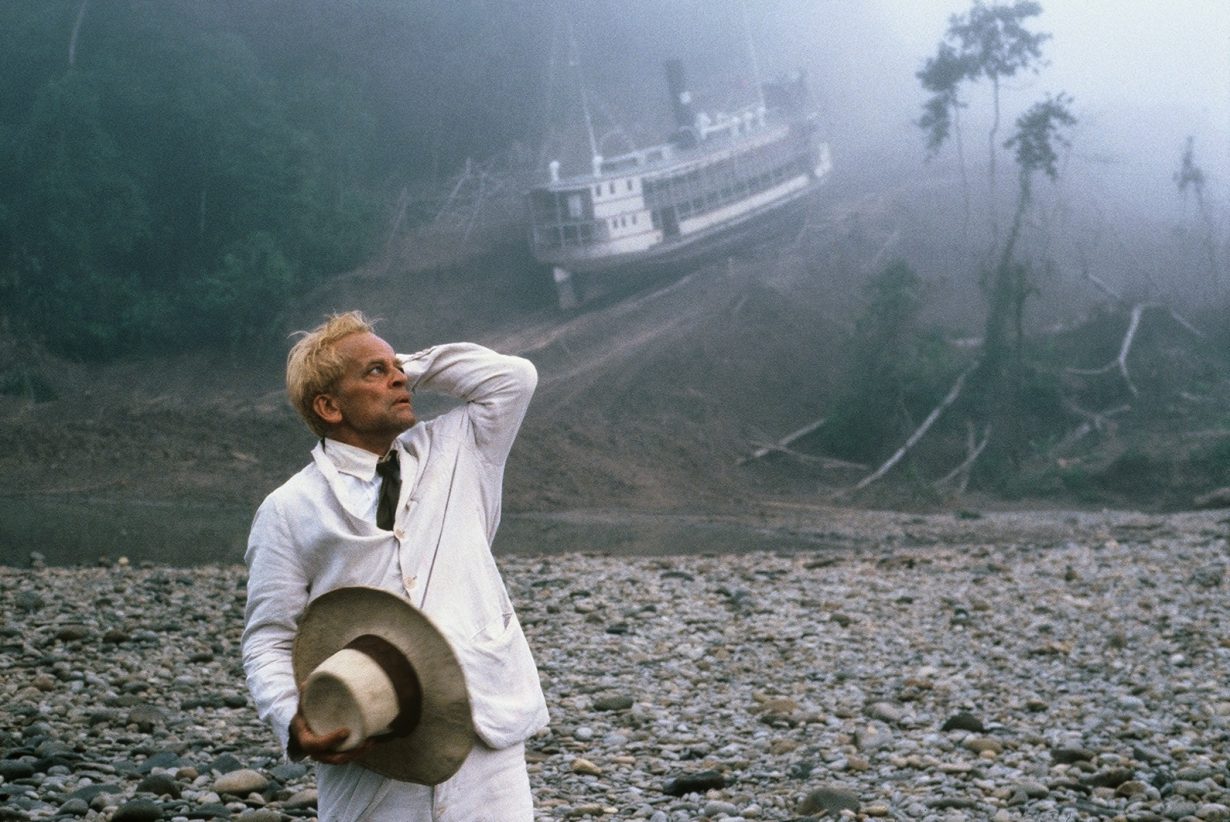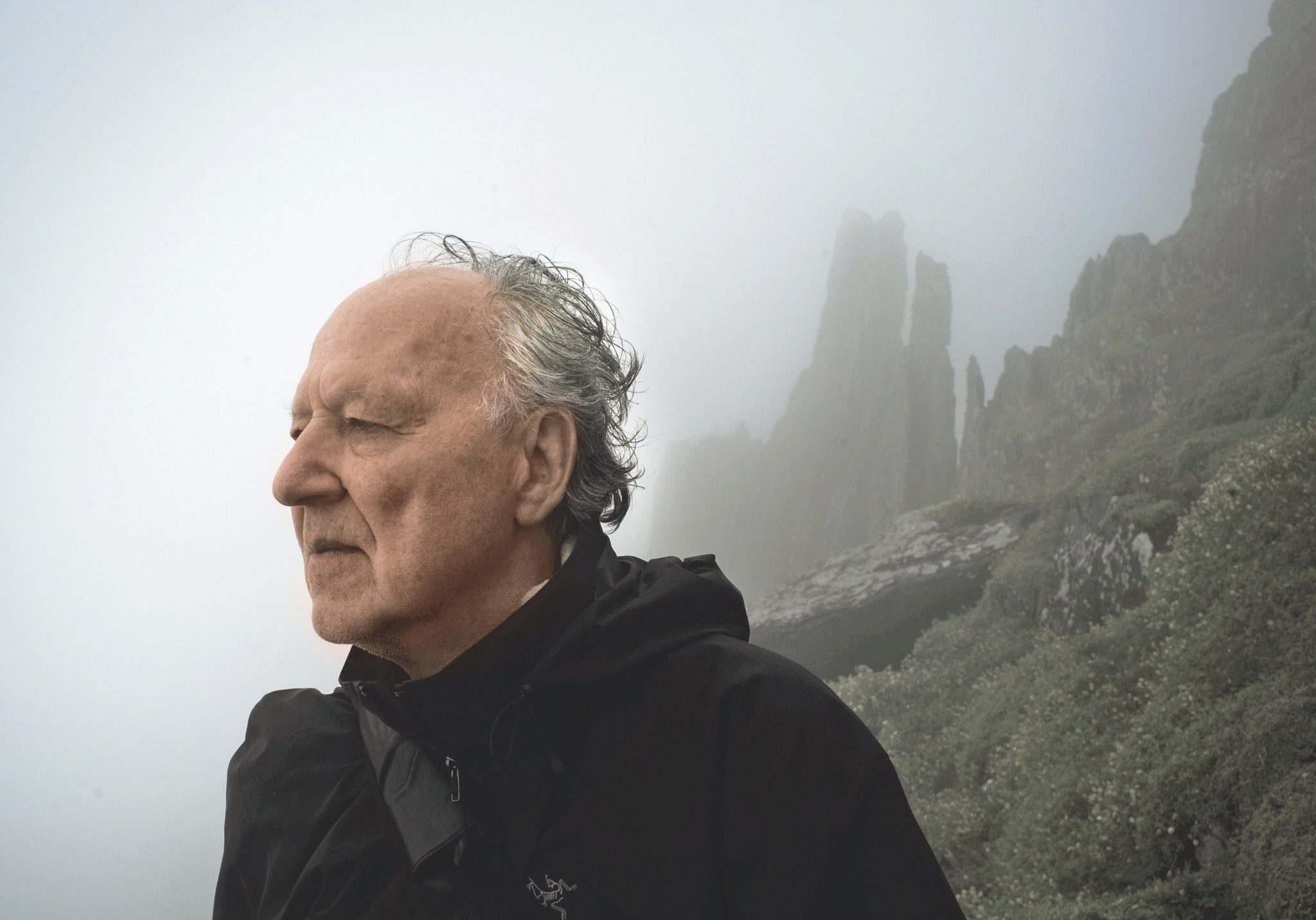The director’s rejection of self-analysis reveals something fascinating about his artistic process
Since I was an undergraduate student (with, frankly, deluded dreams of being a director) I’ve had a framed picture of the German filmmaker Werner Herzog in pride of place in my home. This picture (ripped from a magazine) which I affixed to the walls of even the dankest of temporary accommodations, symbolised to me the thrilling possibilities of art and the imagination. Herzog’s surreal films and documentaries, which traverse the globe from Antarctica to the Chauvet Caves, seemed to my young self like the pinnacle of what cinema could achieve – courageously confronting suffering in the world, while remaining deeply humane. Yet, beyond the dazzling kaleidoscopes of his many features, Herzog himself has remained an enigma, despite the familiarity of his iconic gravelly voiceovers. Herzog may interview regularly, but he says very little about his own personal life. Into this vacuum of intimate information, stories of an almost mythic quality have built up around him – the time he saved Joaquin Phoenix from a car wreck in LA, the time he was shot at with a pellet gun (but carried on with eerie calm) while being interviewed by Mark Kermode for the BBC. Each story creates more mystery, taking Herzog the man, the individual, further from our understanding. I thought that his memoir, Every Man for Himself and God Against All, might finally offer the chance to get a sense of Herzog’s inner drives, his passions, his vision of the world. But it turns out that this book, in a deft English translation by Michael Hofmann, isn’t really a memoir at all.
Yes, it covers a wide span of captivating stories from Herzog’s life, beginning with his childhood in a tiny, remote village in the German Alps, facing the challenges of poverty and the rise of fascism; then traversing a dramatic youth and maturity of adventure, danger and creation. Yes, the book contains a glut of narrative – picaresque tales of hallucinatory windmills, terrifying actors, unhinged warlords and impossible projects abound. But narrative alone does not make a memoir. As readers we also expect self-reflection: to be let in to the intimacy of someone’s life, emotions, ethics and, in the case of artists’ memoirs, creative process. This book contains the facts of Herzog’s life and art – his three marriages, many friendships, children, creative collaborators and films – but not the deep inner world of the man who lived through these things and made these choices.

An example of this is seen in the section focused on one of his most famous films, Fitzcarraldo (1982), which features Klaus Kinski as a would-be rubber baron and obsessive music lover, who attempts to transport a steamship over land to access rich rubber territory in the Amazon basin. He does this to try and raise money for his quixotic, reckless dream – building an opera house in Iquitos, Peru. Herzog discusses the huge personal challenges he faced in bringing the film to fruition, as well as the terrible human price that was paid for such an ambitious and difficult project. Some of his crew were shot with arrows, one permanently lost his voice after an arrow went into his throat. A woodsman was bitten by a snake and used a chainsaw to amputate his own foot to survive. The worst disaster came with a plane crash in which many were hurt, and one man was left paraplegic. Herzog writes, ‘That weighs on my heart to this day.’ But despite all this horror, he presses on: ‘I said if this film failed all my dreams would be at an end, and I didn’t want to live as a man without dreams…’ Clearly Herzog feels the suffering of his crew deeply, but we have no sense of what this feeling actually is. Is it sympathy? Guilt? Regret? Does he feel that his dreams were worth these people’s pain (however accidental it was), or not? Does he feel torn between the demands of creation and the demands of humanity? What do his dreams mean to him, and why can he not go on without them? We never find out.
The hoped-for insight into this odd, uncompromising and fiercely original man never arrives. Indeed, Herzog himself is open (perhaps scandalously so, for a memoirist) about his horror of personal introspection: ‘What does my average day look like? Who are my friends? What sort of life do I lead? I have trouble describing myself because I have a vexed relationship with mirrors … To this day, I couldn’t tell you what colour my eyes are. Introspection, navel-gazing, is not my thing.’ In fact, Herzog not only ‘has trouble’ digging into himself – he considers it deeply wrong: ‘I’d rather die than go to an analyst, because it’s my view that something fundamentally wrong happens there. If you harshly light every last corner of a house, the house will be uninhabitable. It’s like that with your soul …’ The reader has every reason to feel justly frustrated at this point. However, despite myself, I started to realise that this rejection of introspection isn’t only the avoidance or writerly selfishness it may appear to be. Because, in his own ornery, infuriating and maniacal way, Herzog’s screeds against self-analysis allow us to begin to understand something fascinating about his artistic process.
Though Herzog is able to create riotous, uncontrolled, vivid cinema, he seemingly can’t bear to disturb the delicate waters of his inner world. The reason why may be contained in this mundane reflection: ‘I like to sleep whenever I can. I have no dreams … No matter how I’m woken up, I wasn’t dreaming. I dream maybe once a year, then always banally, that I had a sandwich for lunch, for instance.’ Unlike everyone else, Herzog doesn’t dream while he is asleep, but while he is awake. Self-analysis would mean picking apart that highly unusual waking dreamstate, that rule of drives over reason, and therefore risk destroying it. So he rattles off stories without picking apart their inner workings, creating a memoir which, despite all its rich drama, evocative writing and mind boggling jeopardy, is oddly listless and distant.
As a documentary maker, Herzog has an almost magical ability to reach for the right question, to know which simple words will unlock the secrets of the person sitting in front of him (a process, in fact, quite like Herzog’s hated psychoanalyst interpreting their patient). There is a moment in his 2012 docuseries about capital punishment in the United States Death Row, where he talks to a man who was driven from his prison to a place of execution, just to be pardoned at the very last minute. Herzog retraces this tortuous journey with him, looking out the window at a dusty, ugly American landscape of broken motel signs, smashed beer bottles and empty paddling pools. He asks, ’What did you think when you saw this landscape passing you by?’ The man replies, ‘I thought it was Jerusalem. The Holy Land.’ The banal landscape we see glowed divinely for this man, simply because it was alive. It was a world worthy of love because it was the world.
Herzog’s films demonstrate a deep knowledge of our bizarre, unpredictable, terrible and glorious planet – but perhaps that kind of knowledge cannot be explained without also being extinguished. Perhaps a creator as wild as Herzog cannot give us entry into his spirit without giving himself away. Herzog’s strange sorcery remains an indelible mystery, which, as this book makes stubbornly apparent, is just the way he wants it.
Every Man for Himself and God Against All by Werner Herzog, translated by Michael Hofmann. Bodley Head (hardback), £25
Rebecca Tamás is a poet, essayist and environmental writer. Her most recent book Strangers: Essays on the Human and Nonhuman is out now with Makina Books.
